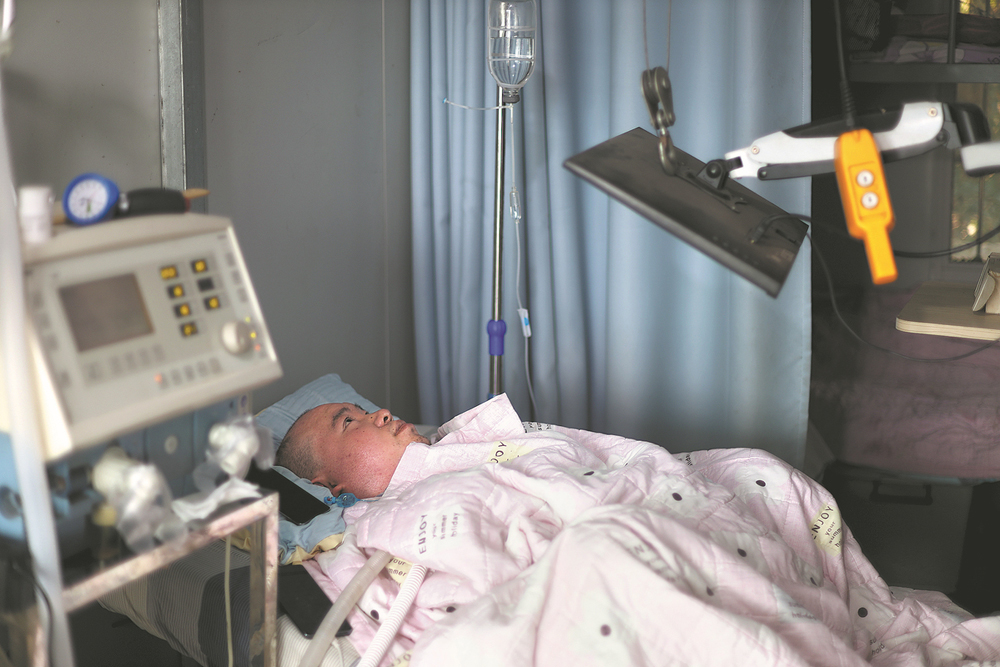36-year-old Li Xia lives with a rare congenital condition that leaves him with the use of only one finger and one toe. Despite this, he independently runs a smart farm, inspiring his village with his high-tech agricultural approach.
Self-taught in the Internet of Things (IoT) technology for agriculture, Li Xia has been dubbed the "Stephen Hawking of rural Chongqing." The renowned British scientist Stephen Hawking battled amyotrophic lateral sclerosis (ALS) throughout his life while making groundbreaking contributions to theoretical physics and cosmology.
As a child, Li was diagnosed with Duchenne muscular dystrophy, a rare genetic neuromuscular disorder. While different from ALS, both diseases cause muscle weakness and atrophy, sometimes leading to death from complete paralysis. At 32, Li underwent a tracheotomy, similar to Hawking. However, due to more severe damage to his respiratory muscles, he became reliant on a ventilator.
"I never thought I would live past 30, as many with my condition pass away in their 20s. Now, I just want every remaining day to be meaningful," Li said. His speech is punctuated by the rhythmic whirring of his ventilator.
 |
Li Xia manages his farm from his bed, surrounded by medical equipment. Photo: China Daily |
Li Xia manages his farm from his bed, surrounded by medical equipment. Photo: China Daily
In June, his farm sold its entire hydroponically grown celery harvest of about 5,000 kg within a week, generating 10,000 CNY. Another crop has already sprouted and is expected to be ready for sale by mid-September.
From his farm's control room, housed in a converted shipping container, Li manages operations from his bed, surrounded by ventilator tubes and equipment. Using his left index finger to control the mouse and his right toe to click, he monitors 10 display systems on an overhead computer screen.
Meanwhile, his 61-year-old mother, Wu Dimei, moves between greenhouses, checking on the plants. "My son is the brains of the farm, and I am the hands and feet," Wu said.
In addition to caring for Li, Wu handles the farm's daily tasks, acting as electrician, grower, machinery technician, and plant health manager, all under her son's guidance via video calls.
Li's path to science was unconventional. He lost the ability to walk and had to leave school at 11. However, after borrowing physics textbooks from a neighbor, he became fascinated by mechatronics. Li taught himself physics and programming using Arduino software, ordering chips online for experiments.
Despite physical and financial challenges, Li remained optimistic. Through online part-time work, he purchased his first electric wheelchair at 18, later modifying it for improved functionality.
In 2020, Li's health declined, his motor functions deteriorating to the point where only one finger and one toe remained functional. Following the tracheotomy, he became tethered to tubes and a ventilator, temporarily losing his ability to speak.
After over a year of recovery and with his health stabilized, he returned to his passion for science. Using his programming and IoT skills, Li developed an automated irrigation system for his balcony. At 33, with his mother's support, he established the hydroponic farm.
After initial success with spinach, cucumbers, choy sum, lettuce, and celery, Li decided last summer to focus on celery, a high-demand vegetable in Chongqing. Hydroponic celery can sell for at least twice the price of soil-grown varieties. By early this year, the farm became profitable.
Li Xia's success has garnered support from villagers and the local government, who have provided funding, technology, manpower, and marketing assistance.
"Everyone admires Li Xia," village head Ni Jie said. "He has brought smart agriculture to our traditional community, introducing new technologies and creating jobs."
Li Xia also shares his knowledge online, posting practical hydroponics tips on the video platform Bilibili, where he has almost 10,000 followers and over 13,000 likes. He never discusses his illness, focusing instead on helping others. Recently, Li was nominated for the "Chongqing Good People Doing Good Deeds" award for his achievements.
He is also an advocate for patients with rare diseases. "I hope the public can learn more about rare diseases," Li said. "I've suggested to the government that more prescription drugs for rare diseases be included in the medical insurance catalog."
According to the World Health Organization, rare diseases affect an estimated 0.65 to 1 in 1,000 people. More than 300 million people worldwide live with these conditions. A report published in China indicates that the country has over 20 million patients with rare diseases, but only about 5% of rare diseases globally have effective treatments, and many existing drugs are prohibitively expensive.
Binh Minh (China Daily)












